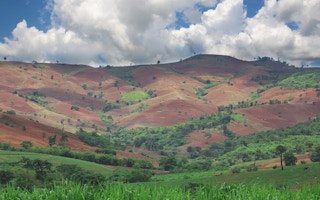The planet’s forests have dwindled by 3 per cent − equivalent almost to the land area of South Africa − in the last 25 years, according to a new assessment by the UN Food and Agriculture Organisation.
While the planet continues to lose its forests – albeit at a slower rate – through felling, burning or being turned into farmland, another UN study predicts that the economic cost of degraded agricultural land in the form of lost ecosystem services now amounts to up to US$10 trillion a year.
Within 10 years, 50 million people could have been forced to abandon their homes and livelihoods to become migrants. If all those people were assembled in one place, they would constitute the planet’s 28th biggest nation in terms of population.
Increasing levels
Forest loss and farmland degradation are both part of climate change accountancy. The rise in greenhouse gases is in part linked to the loss of forest cover to soak up the carbon dioxide released by the burning of fossil fuels.
But increasing levels of heat and drought are likely to accompany climate change, increasing the area of desert or land too arid to support life and industry.
So in losing forest, and in watching farmland become saline because of over-irrigation, or exhausted by intensive cultivation or overgrazing, or simply increasingly too arid to support vegetation, humans are witnessing the loss of all sorts of valuable services not normally recorded by accountants.
Ideas such as “natural capital” and ecosystem services are attempts to place a practical value on things that nature normally delivers for free.
That is because living things – plants and soil fauna in particular – provide food, fibres, medicines and building materials, as well as helping to provide clean water, regulate disease, and recycle nutrients.
The United Nations University report believes that the loss of these services could now be between $6.3 trillion and $10.6 trillion a year in value. This is between 10 per cent and 17 per cent of global gross domestic product.
Alternatively, the “lost services” per square kilometre amount to between $43,000 and $72,000. Or, to put it yet another way, that is between $870 and $1,450 per person per year for everyone on the planet.
And 57 per cent of world agricultural land is now either moderately or severely degraded, the report says. The percentage of global land area hit by drought doubled between the 1970s and the early years of this century.
Ecosystem services
One-third of Africa is threatened by desertification, and land cover changes since 2000 are responsible for half to three-quarters of the value of lost ecosystem services.
Separate from this, but also part of the overall climate change accounting equation, has been the steady loss of forests.
Researchers recently completed the first realistic “census” of the planet’s forests, and arrived at an inventory of more than three trillion trees, but also the conclusion that humans were destroying forests at the rate of 15 billion trees a year.
The latest UN global forest assessment acknowledges that, 25 years ago, around 7.3 million hectares were being lost each year. This slowed to 3.3m hectares a year between 2010 and 2015.
Tropical forests were hardest hit, with a loss rate of 10 per cent. A decline in “natural forest” has been offset by a 66 per cent rise in planted forest, and Australia in particular has actually gained 1.5m hectares of forested land in the last five years.

















